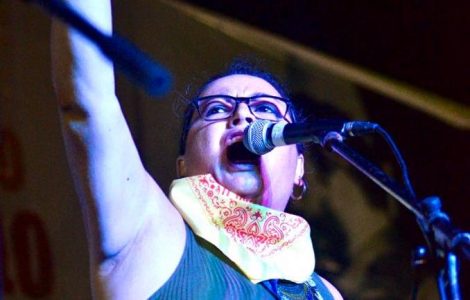“There is no one way of thinking, no one recipe for organizing, there are many ways, and this resistance built from the grassroots is a reflection of the moment we are experiencing”, said Martha Flores, Coordinator of Jubilee South Americas, in Havana, Cuba, on Saturday.
She was interviewed by Real World Radio on the second day of the Anti-Imperialist Meeting of Solidarity for Democracy and Against Neoliberalism, where 1500 people from over 90 countries are participating.
A panel on “Challenges for the articulation of our struggles with solidarity” took place in the morning, and then six thematic commissions towards an Action Plan held sessions during the afternoon.
The commissions were: “Solidarity with Cuba and other just causes”; “People against free trade and transnational corporations”; “Decolonization and cultural wars, strategic communications and social struggles”; “Youth: strategies and continuity of the struggle”; “Democracy, sovereignty and anti-imperialism”; “Integration, identities and common struggles”.
The Anti-Imperialist Meeting was organized by the Cuban Institute of Friendship with the Peoples (ICAP), the Cuban Chapter of Social Movements and the Continental Day for Democracy and Against Neoliberalism. [1] Almost every speech, both from panelists and the public in general, highlighted an element of solidarity with the Cuban people against the attacks of US imperialism, worsened under Trump’s administration. Solidarity was also expressed with all mobilizing Latin American peoples, including Chile, Ecuador, Haiti and Bolivia.
Real World Radio also interviewed indigenous leader Francisco Rocael, of the coordination of the Guatemalan Mayan Peoples Council (CPO) and the Movement of People Affected by Dams of Latin America (MAR). “We must contribute to strengthening the articulation between organizations, networks and social movements at continental level against the huge challenges we are facing today,” he stated. Because “nowadays, the participation of all peoples to dream and to build their own well-being models is at risk.” “Anti-democratic and neofascist policies, hidden behind a neoliberal economic model are resurfacing,” stressed Francisco.
The leader also stated that “we need to join forces to build new participation and decision-making processes in the region.” He made reference to his concern over the initiatives raised in the Guatemalan Congress and also other countries to pass new regulations about popular consultations. The right to free, prior and informed consultation has been recognized by Convention 169 of the International Labor Organization (ILO). According to the CPO leader, over 90 consultations have been carried out throughout the country, organized by the communities themselves, with the participation of over two million people.
“There is corporate capture, a strategy by corporations to regulate this right, this mechanism. They want to delegitimize, create confusion and restrict the scope of consultations,” denounced Francisco.
“Internationalist solidarity is crucial and needs to be a key element in our strategies to articulate the struggles.”
On Saturday morning, during the “Challenges for the articulation of our struggles with solidarity” panel, the Chair of Friends of the Earth International, Karin Nansen, from Uruguay, said: “On the continent we are witnessing an increasing onslaught against working classes, a violent offensive orchestrated by imperialism and the conservative forces that today lead democratic setbacks in the region.” These powers aim to “impose their racist and misogynist hate, and any strategy is valid for them, even coups d´Etat and militarization,” she added.
Karin also stressed that “indigenous peoples and social movements who defend the rights of people are facing systematic persecution, criminalization and death, with the aim of intimidating and silencing us through fear, in order to put an end to our struggles. They are even trying to make us disappear.”
The environmental activist made reference to peoples’ struggles in the region, led by unions, peasants, women, indigenous peoples, environmental activists, defenders of territories and peoples’ rights, among other actors. And she stressed that “internationalist solidarity that the Cuban people have taught us is essential and must be a central part of our strategies for articulating the struggles.”
Meanwhile, leader Manuel Bertoldi, of ALBA Movimientos, who spoke at the panel on behalf of the International Peoples’ Assembly, listed some of the key challenges faced by Latin American social movements. He said: “we face the need to consolidate national and popular blocs in each of our countries with an anti-neoliberal perspective, or we will face the consolidation of authoritarianism and fascism.”
Manuel added, among other things, that “we need to promote a program of social transformation through mobilization.” Along these lines, he stressed some needs: “support economic sovereignty with state policies that deprioritize transnational capital and national oligarchies; a strong state with social commitment; and liberal reform of the state guided by peoples’ organization and democracy including popular economy and popular power.”
Social Movements Communications Convergence
